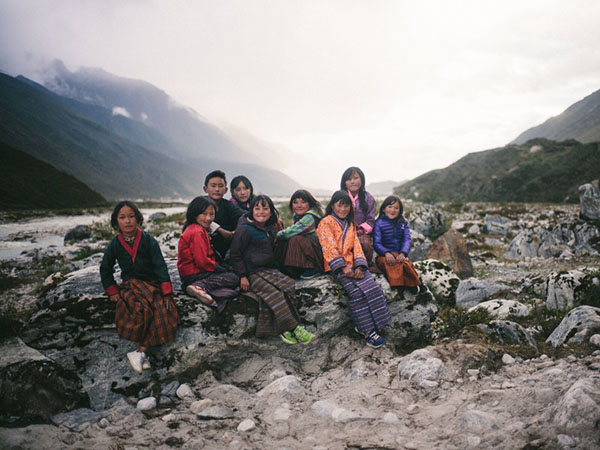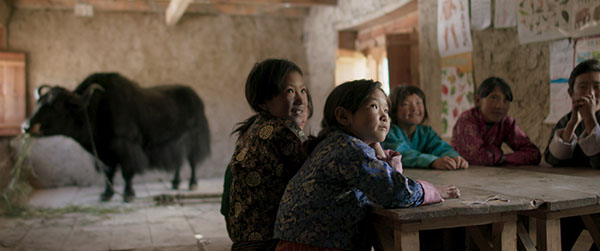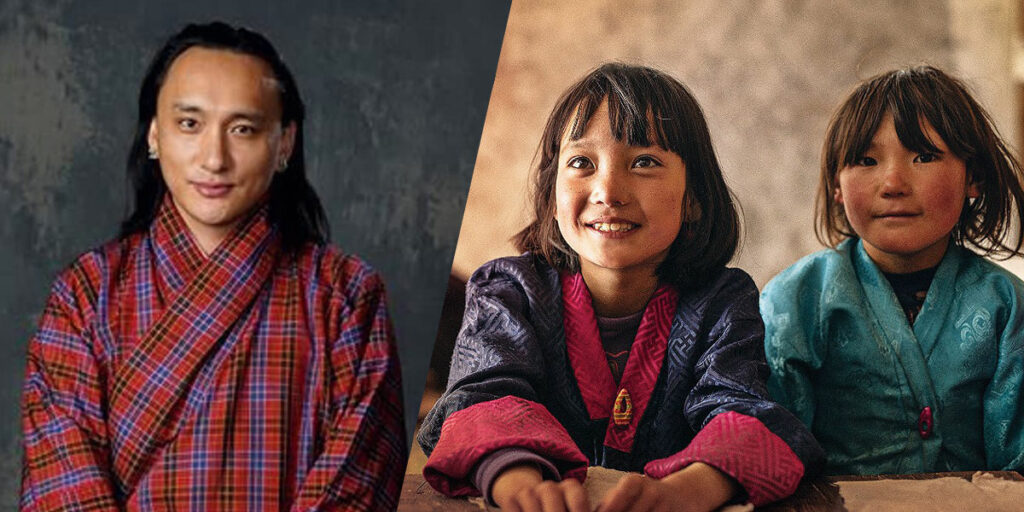In anticipation of Lunana: A Yak in the Classroom ’s UK release, we spoke to director Pawo Choyning Dorji for an interview about his Oscar-nominated feature film debut.
Set in a small village high above the treelines of the Himalayan mountains, Lunana: A Yak in the Classroom follows teacher Ugyen (Sherab Dorji) as he makes this unlikely location a temporary home. He’s been assigned to work in the world’s most remote school to give the young children there an education. Disgruntled and disillusioned by his home country of Bhutan, and even more aggravated by the lack of amenities in Lunana, Ugyen initially views this assignment as nothing more than a stop on his way to Australia, where he hopes to fulfil his dreams of becoming a professional singer. But after getting to know the small, enthusiastic cohort of students at the school, he starts to view the world a little differently.
Lunana: A Yak in the Classroom received the first ever Oscar nomination for Bhutan at the 94th Academy Awards due to its insight into a village untouched by the outside world. With heart-warming performances from a cast of non-professional actors, Lunana feels as real as it gets. Educational as it is entertaining, Lunana: A Yak in the Classroom is a film everyone bogged down by the stresses of living in a westernised society should see, as to watch it is to feel like you’re setting yourself free.
We spoke to director, writer, and co-producer Pawo Choyning Dorji for an interview about his motivations for making the movie, what it was like to live as a local whilst shooting Lunana, and what’s next for him.
THE HAPPIEST PLACE ON EARTH: PAWO CHOYNING DORJI ON THE INSPIRATION BEHIND LUNANA
Thank you for taking the time to speak to me today. I loved Lunana and I got so much out of the viewing experience. How did you come up with the idea for this film, and was it something you always wanted to make, or was there something that happened that inspired the story?
Pawo Choyning Dorji: Unlike most Bhutanese, I grew up and spent most of my formative years outside of Bhutan. Then, when I returned to Bhutan, you could say I went through the same journey as Ugyen, discovering Bhutan and its culture, learning about it, and I really wanted to share that in this film.
I also wanted to touch upon happiness. Being Bhutanese, I can guarantee you that once I introduce myself as being from Bhutan, the next thing I hear is, ‘oh, you must be very happy then.’ It’s almost like being Bhutanese means you’re meant to be happy. But as you see in Lunana, there are many people in Bhutan who are not happy, and who wish to seek out what life is beyond our country. So many of our youth are leaving Bhutan, and I wanted to capture this story.
People in third world countries like Bhutan always try to find what they’re looking for in the western world. In Bhutan right now, everyone wants to go to Australia, and I was thinking, what does Australia represent? It represents the developed, western world, the city, urban life, and glittering lights. I wanted to create a story where the protagonist is at the opposite end, so I decided, let’s go to the most remote, furthest, desolate place in Bhutan – Lunana. The message was, could we discover in the darkness and shadows, what we long for in the light? As we show in Lunana, it really is that experience of the shadows, that makes us appreciate what the light is even more.

THE BEAUTY OF AUTHENTICITY: PAWO CHOYNING DORJI ON THE MAKING OF LUNANA
When you were filming on location, you had to rely on solar batteries to power your equipment. Did filming on location, and living like the locals, help you feel a deeper connection to the narrative?
Pawo Choyning Dorji: Definitely. When I was planning to make this film and I proposed the idea to my friends and filmmakers, they said, ‘Pawo, you’re crazy! This is filmmaking. You’re supposed to fake it. People don’t go to the actual places!’ Then I thought, if I go to the actual place, it’s going to be difficult, but you’ll be able to capture the authenticity of the place and the people. All my actors were from the village, where they didn’t even have a lightbulb, so you can imagine how they are in front of the camera! I wouldn’t be able to get that anywhere else. I feel this made it more authentic.
I took one shower in two months whilst living up there. Living in a place with no telephone, no electricity for that long, working and sleeping in the same clothes, sleeping on the floor every day at 5.30pm when it gets dark, really helped. When you’re in that kind of place, and you experience that kind of life, it opens your senses, and it makes you see things you wouldn’t normally see as well as the things you take for granted. I feel the authentic Lunana life that myself, my cast and crew went through manifested itself in Lunana: A Yak in the Classroom.
I must know: did you take the eight-day trek to the village like Ugyen?
PCD: Yes! We had to plan this trip carefully. The window to make this film was so short, so we had to aim to shoot during the 2-3 months in the summer and fall that Lunana is not covered in snow and ice. When I wrote the script and came up with the story, I had never been up there. When the script and story were in place, I went up to see how it was.
There are a lot of preparations to make when you take a cast and crew of forty people up to a place where the village’s population is just fifty. As there’s no gas up there, we had to carry our own firewood to make a fire. For over a year we had a whole team with an army of mules carrying up supplies. All our supplies including rations and lights had to be carried up.
This whole trek was in the pre-production. My plan was to film as we went up for the actual shoot too, but it was too expensive and there were too many risks. This meant for the actual shoot, we just took a chopper. But the whole year of preparation was done without any choppers.
When you were in Lunana, how did the locals react? Were they open to sharing their world with you, or were they slightly protective?
PCD: They were very open. The Bhutanese in general are very welcoming and open-hearted. For example, if you go trekking into Bhutan and you go to any village, I can assure you that even if you’re a stranger, they would be welcoming you into their houses, sharing their meals with you. The Lunana people were like that as they opened themselves up, shared their stories and their lives with us. It was very beautiful. It’s a very noble community, and it was an absolute honour for me to share them with the rest of the world through Lunana: A Yak in the Classroom.
There was always a part of me that felt, ‘what right do I have?’ because here is a community that’s never seen the outside world, and the outside world has never seen them, and here I am with a camera, trying to capture their lives and share it with the rest of the world. I kept questioning if I was doing the right thing, but just as I was leaving, the government came in to set up the telephone towers. Facebook has come in, YouTube has come in, TikTok has come in, and life has changed there now. I can say that this film is the first and last glimpse into a community that was untouched by the outside world.
You mentioned you worked with a lot of non-actors on Lunana, like Pem Zam, who melted my heart. Was it a conscious decision to work with non-actors rather than professionals, if so, why did you make this decision?
PCD: We don’t have any professional actors in Bhutan. I write this amazing scene out, then it hits me, where will I ever find actors to play these roles? Instead of seeing the disadvantages, there are a lot of advantages if you cast the right people. For example, Sherab Doji who plays Ugyen, this is his first time acting. When I met him, he came across as this young, confident musician who loved performing in bars in the city, and he had a good screen presence. When I talked to him, I said, ‘what do you dream for the next few months?’ and he said, ‘I’m planning to go to Australia where my parents have settled.’ I was like, ‘please, hold on for a few months and make this movie with me.’
Originally, when I wrote Pem Zam’s character, it was a little girl who was beautiful, confident, outgoing, and charmed the teacher. But when my cinematographer saw the script, he was like, ‘how are you going to find someone like this in a village of only forty people? You might not even find a girl who can pull this role off in the whole of Bhutan!’ But we lucked out. We went up and this girl came to see me, and she was one of only six girls there. She was so good.
To take advantage of working with non-actors, I really spent time with them, and I learnt about their lives. Then I adapted the script in such a way that it’s themselves. This means that all the children, including Pem Zam and the head of the village, weren’t acting and instead playing themselves.
When I met Pem Zam her father was a drunk who couldn’t even get out of bed. She had such a harsh upbringing, but she was just so beautifully confident even in that harshness, and I wanted to portray that in the movie. Every time we set up the camera, I had no instructions for these people. I would just say, ‘this is your life, do what you usually do, tell us your story.’ In this way, Lunana feels like a docu-feature.
I was really worried for Pem Zam because schools in Lunana only go up to sixth grade. Usually, the students drop out after that and become yak herders and get married when they’re seventeen or eighteen. It’s a very hash life. I wanted Pem Zam to continue her education, and I faced a lot of opposition from her father who didn’t want to send her beyond Lunana. Since you had a connection with Pem Zam, I’m happy to share with you that out of her own merit and hard work, she got admitted into one of the most prestigious boarding schools in Bhutan. In fact, she has become to first student from Lunana who will be educated beyond the sixth grade. I’m very proud of her, we connected and we’re in touch. I’m always trying to help her.
FROM LUNANA TO BEYOND: PAWO CHOYNING DORJI ON THE FILM’S MESSAGE AND WHAT’S NEXT FOR HIM
Lunana: A Yak in the Classroom is being released in the UK on March 10th. What do you hope that a UK audience, who live in a very westernised society, will get from this film?
PCD: I think Lunana is one of the most diverse cinematic experiences you will get. It’s a glimpse into a place that most UK audiences would have never had a chance to learn about or see and experience. Despite the differences, the underlying theme of this movie is something very universal. It’s about searching for where you belong, searching for home and happiness. In this way, when you experience something so diverse but with a theme that is so universal to all of us, it can connect. It shows you that we are not so different after all, within all this diversity, there is this theme that unites humanity.
I feel like Lunana’s success, going from the world’s most remote classroom to cinemas around the world, as well as earning an unprecedented Oscar nomination for Bhutan, is because of this. This film shows that we are actually all the same. Lunana is a celebration of humanity, in the form of art.

What’s next for you? Do you have anything else you’re working on right now? Can we expect more feature films from you in the future?
PCD: I’m working on my second film. It touches upon how a society had to adapt so that it can still be relevant in this modern, digital world. It is inspired by the very, very unique country I come from. My country was the last country in the world to allow television and to connect to the internet. It’s a little different from Lunana because there are multiple storylines and themes. I’m excited to hopefully share this with the world.
This interview has been edited for length and clarity.
Lunana: A Yak in the Classroom will be released cinemas and on digital platforms in the UK on March 10, 2023. In the US, the film is now available to watch on digital and on demand. Read our review of Lunana: A Yak in the Classroom!

